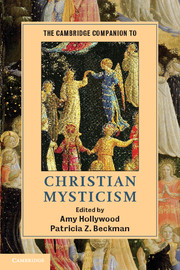Book contents
- Frontmatter
- Contents
- Contributors
- Introduction
- Part I Contexts
- Part II Key Terms
- Part III Contemporary Questions
- 13 Latin and the Vernaculars
- 14 Transmission
- 15 Writing
- 16 The Body and Its Senses
- 17 Mysticism and Visuality
- 18 Emotion
- 19 Authority
- 20 Gender
- 21 Sexuality
- 22 Time and Memory
- Select Bibliography of Christian Mystical Texts up to around 1750
- Select Bibliography of Modern Works Related to the Study of Western Christian Mysticism
- Author and Artist Index
- General Index
- References
19 - Authority
from Part III - Contemporary Questions
Published online by Cambridge University Press: 05 December 2012
- Frontmatter
- Contents
- Contributors
- Introduction
- Part I Contexts
- Part II Key Terms
- Part III Contemporary Questions
- 13 Latin and the Vernaculars
- 14 Transmission
- 15 Writing
- 16 The Body and Its Senses
- 17 Mysticism and Visuality
- 18 Emotion
- 19 Authority
- 20 Gender
- 21 Sexuality
- 22 Time and Memory
- Select Bibliography of Christian Mystical Texts up to around 1750
- Select Bibliography of Modern Works Related to the Study of Western Christian Mysticism
- Author and Artist Index
- General Index
- References
Summary
The core meaning of authority is “the power of authorship.” Thus authority in human societies has to do with being able to maintain, create, or modify relationships and the flow of benefits that they structure. In Christian theology, the ultimate source of this power resides in God, and it is mediated through Jesus, the Holy Spirit, the scriptures, and the church. Yet the meaning given to each of these terms, and the way they are played out in social structures and relationships, changes radically in different eras and cultures. For example, in traditional societies, authority resides in the elders, revered ancestors, and the canon of Auctoritates that are presumed to have a special intimacy with the divine. A Christian mystic, for example, would gain authority and the influence by demonstrating association with Christ, the clergy, the saints, and the Bible. In modernity, on the other hand, authority is more often identified with comprehensive expertise or with sheer force (whether physical, emotional, or rhetorical). In this case, the mystic’s influence is likely to derive from a demonstration of unusual insight or of apparently supernormal powers.
One of the key distinctions in relation to how mysticism functions within social networks is that between popular or charismatic authority and elite or institutionalized authority. Popular authority operates at a grassroots level and involves offering people something they want – often healing, safety, personal affirmation, a meaningful story to live by, or a sense of belonging. Popular authority is often in tension with elite authority, which operates in a universalized framework and asserts systematic procedures for determining who may have authority. When people identified as having extraordinary knowledge of God gain a popular following, representatives of elite authority tend to react by striving either to gain control of the movement or to destabilize it. This pattern is played out over and over again in the history of Christian mysticism.
- Type
- Chapter
- Information
- The Cambridge Companion to Christian Mysticism , pp. 305 - 314Publisher: Cambridge University PressPrint publication year: 2012
References
- 12
- Cited by



